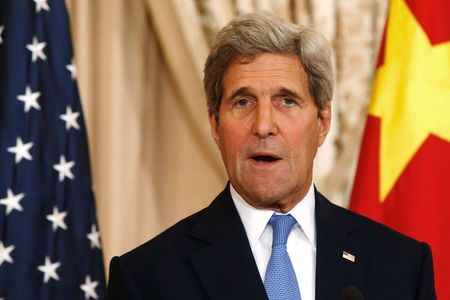By Patricia Zengerle
WASHINGTON (Reuters) - Hundreds of U.S. lawmakers pressed Secretary of State John Kerry to lean harder on Iran in talks over its nuclear program in a letter released on Thursday after Israel warned Washington not to go easy on Tehran.
Three hundred and fifty-four members - four-fifths - of the U.S. House of Representatives signed the letter sent to Kerry on Wednesday night, expressing concerns that an agreement on Iran's nuclear program might not require sufficiently strict inspections of its nuclear facilities.
The U.N. nuclear watchdog said on Sept. 5 that Iran had failed to address concerns about suspected atomic bomb research by an agreed deadline.
Israeli Prime Minister Benjamin Netanyahu told President Barack Obama on Wednesday that he must make sure any final nuclear deal with Iran does not leave it at the "threshold" of being able to develop nuclear weapons.
Netanyahu has been attempting to shift the global spotlight away from Islamic State fighters in Iraq and Syria and back to Iran, warning that a nuclear-armed Tehran would pose a far greater threat than the militant Islamists.
On Thursday, Netanyahu voiced doubts that his talks with Obama would lead to a tougher U.S. line.
"Both of us want to prevent Iran from obtaining a nuclear weapon. But I say that is not enough. You want to prevent it from (being able to) develop a nuclear weapon in a short term, of weeks or months. What is called breakout time," Netanyahu said in an interview with Israel's Channel 10 television.
Asked whether he was "encouraged" about the issue of preventing Iran from achieving break-out capability after meeting Obama, Netanyahu answered: "I cannot say that. I can only say that I expressed the things important to Israel and Israel's security."
Although Israel backs Obama's efforts to forge a coalition to confront Islamic State fighters, some Israelis fear world powers could go easy on Shi'ite Muslim Iran's nuclear program so it will help in the fight against the Sunni Islamists.

Iran and six world powers are expected to meet again for nuclear talks in Europe in the next two weeks, Iranian and Western officials said.
(Reporting by Patricia Zengerle Additional reporting by Lou Charbonneau at the United Nations, Matt Spetalnick in Washington and Ari Rabinovitch in Jerusalem; Editing by Andrew Hay and Cynthia Osterman)
